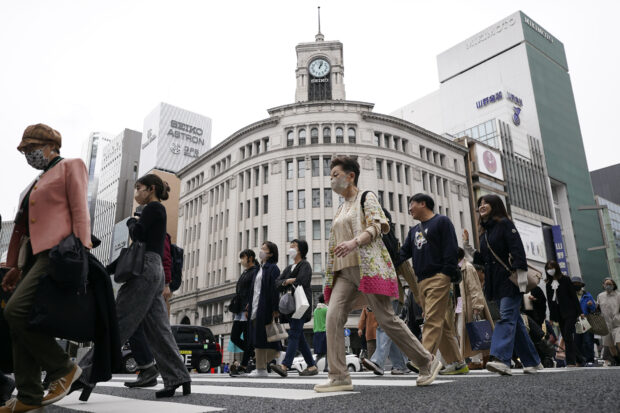
FILE – People walk across a pedestrian crossing in Ginza shopping district in Tokyo on March 31, 2023. (AP Photo/Eugene Hoshiko, File)
Tokyo, Japan — A key survey of Japan’s largest manufacturers showed Monday that business confidence rose for the first time in two quarters, while revised data showed the economy contracted further.
The Bank of Japan’s closely monitored Tankan survey comes ahead of a policy meeting for the central bank later this month with speculation growing it will announce another interest rate hike.
The poll reports the difference between the percentage of firms that are upbeat and those not — with a positive figure meaning more businesses feel optimistic.
READ: Japan’s service activity growth fastest in seven months – PMI
In June, the reading stood at plus 13, beating expectation of plus 11. It followed previous readings of plus 11 in March and plus 13 in December.
Separately on Monday, government data showed gross domestic product shrank 0.7 percent in the first three months of 2024, compared with the previous estimate of a 0.5 percent contraction.
Weaker public sector and private residential investments were behind the downwards revision, according to the internal affairs ministry data.
Japan narrowly avoided a technical recession in the second half of 2023.
The bank in March hiked borrowing costs for the first time since 2007, shifting away from its long-running campaign of negative rates put in place to boost the world’s fourth-largest economy.
READ: Japan’s business mood hits near two-year high, keeps BOJ exit in focus
Monday’s Tankan survey showed that among non-manufacturers, confidence fell to plus 33 from 34, in line with expectations — marking the first decline in the past 16 quarters.
A recovery in tourism was partly offset by weak consumption due to rising prices, Ko Nayakayama, chief economist at Okasan Securities, said ahead of the survey.
For manufacturers, a stronger global chip market has been a “tailwind” but “the high cost of raw materials due to the cheaper yen, and shipment suspensions in the auto industry” had a negative impact, he said.